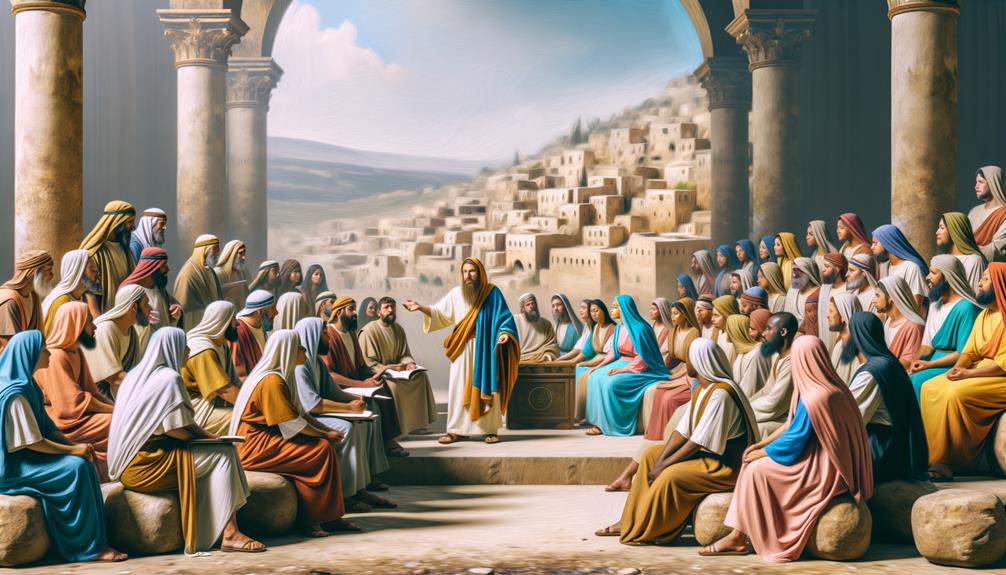God’s Love Meaning in Bible: Unconditional Grace!
God’s love in the Bible is profoundly multifaceted, expressed through the beauty of creation, which reflects divine glory (Psalm 19:1), and entrenched in covenantal promises, such as those made to Noah, Abraham, and Moses, highlighting faithfulness and commitment. The Psalms poetically celebrate God’s steadfast love (hesed) as unwavering and eternal (Psalm 136:1).
Prophetic texts underscore divine compassion and the promise of renewal, exemplified in Isaiah and Hosea. Jesus’ life and sacrificial death embody ultimate divine love, while parables like the Prodigal Son encapsulate themes of forgiveness and reconciliation.
Apostolic teachings and the vision in Revelation further elaborate on this divine love’s depth and breadth, urging continued exploration.

Key Takeaways
- God’s love is demonstrated through creation, reflecting His divine nature and inviting relational experience (Psalm 19:1).
- Covenantal love, such as the Noahic, Abrahamic, and Mosaic covenants, underscores God’s enduring commitment to His people.
- The Psalms highlight God’s steadfast and unfailing love (hesed), nurturing security and devotion among believers (Psalm 136:1).
- Jesus’ sacrificial death and teachings exemplify divine love, offering redemption and modeling self-giving love.
God’s Love in the Bible: Understanding Its Unconditional and Everlasting Nature
| Aspect | Biblical Reference | Explanation |
|---|---|---|
| Unconditional Love (Agape) | John 3:16 | “For God so loved the world that He gave His one and only Son…” God’s love is sacrificial and unconditional, offering salvation through Jesus. |
| Enduring and Everlasting | Jeremiah 31:3 | “I have loved you with an everlasting love.” God’s love is eternal and unchanging, enduring through all circumstances. |
| Compassionate and Merciful | Psalm 103:8 | “The Lord is compassionate and gracious, slow to anger, abounding in love.” God’s love is full of compassion and mercy, even toward sinners. |
| Forgiving Love | 1 John 1:9 | “If we confess our sins, He is faithful and just and will forgive us our sins…” God’s love offers forgiveness and restoration to those who repent. |
| Love that Casts Out Fear | 1 John 4:18 | “There is no fear in love. But perfect love drives out fear…” God’s love brings peace and security, removing fear through trust in Him. |
| Love as a Call to Action | 1 John 4:11 | “Dear friends, since God so loved us, we also ought to love one another.” God’s love compels believers to love others, reflecting His love in their actions. |
God’s Love in Creation

The manifestation of God’s love in creation is intricately woven into the very fabric of the universe, reflecting His divine nature and benevolence.
From the Genesis narrative, we perceive a Creator who meticulously crafts the cosmos, instilling order and beauty. Each element, from the vast expanse of the heavens to the minutiae of biological life, signifies God’s intentionality and care.
The Psalmist eloquently declares, ‘The heavens declare the glory of God; the skies proclaim the work of His hands’ (Psalm 19:1). This creative act is not merely functional but profoundly relational, inviting humanity into a space where divine love is both experienced and reciprocated.
Consequently, creation stands as a witness to God’s enduring love, echoing His presence throughout time and space.
Covenantal Love

In the biblical narrative, covenantal love represents a profound commitment between God and His people, characterized by promises, obligations, and an unwavering divine faithfulness. This form of love is foundational to understanding the relational dynamics between the divine and the human. Covenantal love is exemplified in various key covenants within the Bible, including those with Noah, Abraham, and Moses. Each covenant underscores a unique aspect of God’s enduring love and commitment.
| Covenant | Key Figure | Scriptural Reference |
|---|---|---|
| Noahic | Noah | Genesis 9:8-17 |
| Abrahamic | Abraham | Genesis 12:1-3 |
| Mosaic | Moses | Exodus 19:5-6 |
These covenants illustrate the depth and breadth of God’s steadfast love, providing a basis for the theological concept of divine fidelity.
Love in the Psalms

Psalms, a central book of the Old Scripture, vividly expresses the multifaceted nature of God’s love through poetic and worshipful language.
The psalmists articulate God’s steadfast love (hesed) as everlasting and unfailing, often juxtaposed with human frailty and transience. Through verses like Psalm 136:1, ‘Give thanks to the Lord, for He is good; His love endures forever,’ the psalms emphasize divine compassion, mercy, and faithfulness.
Furthermore, Psalm 23 depicts God as a shepherd, lovingly guiding and providing for His flock. These expressions encapsulate a divine love that is both personal and communal, nurturing a profound sense of security and devotion among believers.
Consequently, the Psalms serve as a rich source for understanding the depth and constancy of God’s love.
Prophetic Expressions of Love

Prophetic literature within the Bible profoundly illustrates God’s love through the recurring themes of covenantal faithfulness, divine compassion, and redemptive promises.
Prophets such as Isaiah, Jeremiah, and Hosea articulate God’s unwavering commitment to His people despite their recurrent failures. Isaiah extols the steadfast love of the Lord, emphasizing His desire to restore Israel.
Jeremiah speaks of God’s deep sorrow over human sinfulness yet highlights His promise of a new covenant written on hearts.
Hosea’s poignant narrative symbolizes divine love through the prophet’s marriage to an unfaithful spouse, mirroring God’s enduring compassion.
These prophetic texts collectively underscore a love that persists, forgives, and seeks to renew the broken relationship between the Divine and humanity.
Jesus: Love Incarnate

The embodiment of divine love, Jesus Christ, manifests God’s love through his sacrificial acts, compassionate healings, and unwavering message of forgiveness.
His ultimate sacrifice on the cross epitomizes the depth of divine love and sets a foundational example for Christian faith.
Additionally, his healing miracles and teachings on forgiveness reveal a profound commitment to restoring brokenness and extending grace to all.
Jesus’ Sacrificial Love
Jesus’ sacrificial love, epitomized by His willingness to endure suffering and death on the cross, stands as the ultimate manifestation of divine love in Christian theology. This act of self-giving love underscores several significant theological tenets:
- Atonement: Jesus’ sacrifice reconciles humanity with God, offering redemption from sin.
- Unconditional Love: His willingness to die for all, irrespective of their sins, exemplifies unconditional divine love.
- Victory over Death: His resurrection signifies triumph over death, providing hope of eternal life.
- Fulfillment of Prophecy: Jesus’ death and resurrection fulfill Old Scriptures prophecies, affirming His messianic identity.
This sacrificial love remains central to Christian faith and practice.
Compassionate Healing Acts
Throughout His ministry, Jesus’ numerous acts of compassionate healing vividly illustrate His role as the embodiment of divine love. His actions not only provided physical relief but also conveyed profound spiritual truths about God’s nature. Jesus’ miracles of healing, such as restoring sight to the blind and curing lepers, encapsulate His mission to bring wholeness and reconciliation to humanity. The following table summarizes several key healing miracles performed by Jesus, underscoring His compassionate nature:
| Miracle | Scripture Reference | Significance |
|---|---|---|
| Healing the Blind Man | John 9:1-12 | Demonstrates spiritual illumination |
| Cleansing the Leper | Matthew 8:1-4 | Symbolizes purification |
| Raising Lazarus | John 11:1-44 | Affirms victory over death |
| Healing the Paralytic | Mark 2:1-12 | Highlights forgiveness of sins |
| Healing Jairus’ Daughter | Luke 8:40-56 | Shows Jesus’ power over life |
These acts exhibit Jesus’ divine compassion and His mission to restore holistic well-being.
Unconditional Forgiveness Message
Central to Jesus’ teachings is the concept of unconditional forgiveness, which He exemplified through His actions and parables. This notion of forgiving without preconditions is pivotal to understanding God’s love in the Bible.
Jesus’ ministry highlighted the transformative power of forgiveness through various narratives:
- The Parable of the Prodigal Son: A father’s unconditional forgiveness of his repentant son.
- The Woman Caught in Adultery: Jesus’ merciful response to an accused woman.
- Peter’s Denial: Jesus’ reinstatement of Peter after his betrayal.
- The Cross: Jesus’ plea for forgiveness for His persecutors.
These instances underscore that divine love is inherently forgiving, urging believers to emulate this boundless grace. This amazing grace meaning has been reiterated in religious teachings and is exemplified through stories of redemption and healing. It serves as a powerful reminder for individuals to cultivate a spirit of forgiveness and compassion towards others, as well as themselves. By embodying this amazing grace, believers can experience the transformative power of love and cultivate deeper connections with one another.
Parables of Divine Love

The parables of the Prodigal Son and the Good Samaritan are profound illustrations of divine love as portrayed in the Bible.
These narratives not only highlight God’s boundless forgiveness and compassion but also challenge believers to emulate these virtues in their own lives.
Prodigal Son’s Redemption
In the parable of the Prodigal Son, Jesus vividly illustrates the boundless and redemptive nature of God’s love, emphasizing forgiveness and reconciliation. This narrative showcases the father’s unconditional acceptance upon the son’s return, symbolizing divine grace.
Key elements include:
- Repentance: The son’s realization of his wrongdoing and his decision to return.
- Forgiveness: The father’s immediate and complete forgiveness without conditions.
- Restoration: The son’s reintegration into the family, signifying spiritual renewal.
- Joy: The father’s celebration reflects the joy in heaven over a sinner’s repentance.
This parable underscores that divine love is inherently forgiving, welcoming, and restorative, providing a profound theological foundation for understanding God’s compassion.
Good Samaritan’s Compassion
Building upon the theme of divine love as illustrated in the Prodigal Son, the parable of the Good Samaritan further elucidates the compassion and mercy that characterize God’s love. This story portrays a Samaritan who aids a beaten traveler, transcending cultural animosities to embody altruistic love. Jesus uses this narrative to illustrate that divine love is inclusive and boundless, urging believers to extend mercy beyond societal boundaries.
| Aspect | Samaritan’s Action | Theological Significance |
|---|---|---|
| Cultural Context | Helped a Jew | Breaking cultural barriers |
| Immediate Response | Provided first aid | Immediate compassion |
| Financial Support | Paid for lodging | Sacrificial giving |
| Broader Implication | Unconditional help | Exemplifies God’s love |
This parable challenges us to emulate divine compassion in our daily lives.
Apostolic Teachings on Love

Apostolic teachings on love provide a profound exploration of divine affection as articulated in the New Covenant, emphasizing both its theological significance and practical application in the lives of believers.
The apostles, particularly Paul and John, investigate love’s transformative power and essential role within the Christian community. Their epistles elucidate the multifaceted dimensions of divine love, urging believers to embody this transcendent virtue.
- Agape Love: The highest form of love, selfless and sacrificial.
- Community Unity: Love as the bond that unites the Christian community.
- Imitation of Christ: Encouraging believers to love as Christ loved.
- Moral Imperative: Love as the fulfillment of the Law.
These teachings profoundly shape Christian ethical and spiritual practices.
Love in Revelation

How does the Book of Revelation portray God’s love amidst its vivid apocalyptic imagery and prophetic messages? Revelation, often viewed through a lens of judgment and finality, also reveals profound aspects of divine love.
God’s love is depicted through the promise of ultimate redemption and the restoration of creation. Despite the tumultuous events described, the underlying narrative emphasizes God’s unwavering commitment to His people.
Revelation 21:4 illustrates this by promising a future without pain or sorrow, signifying God’s desire for eternal fellowship with humanity.
The portrayal of Jesus as the sacrificial Lamb (Revelation 5:6) underscores the depth of divine love, emphasizing Christ’s sacrifice as the ultimate act of love and redemption.
Consequently, Revelation encapsulates both judgment and hope, rooted in divine love.
Conclusion
God’s love manifests in myriad forms throughout the Bible: in the act of creation, through covenantal promises, within the lyrical expressions of the Psalms, and in the prophetic declarations.
This divine love reaches its zenith in the incarnation of Jesus, is illustrated through parables, and is expounded upon in apostolic teachings.
Finally, the book of Revelation encapsulates this enduring love.
Each witness reveals a facet of divine love, creating a thorough and profound theological tapestry.






